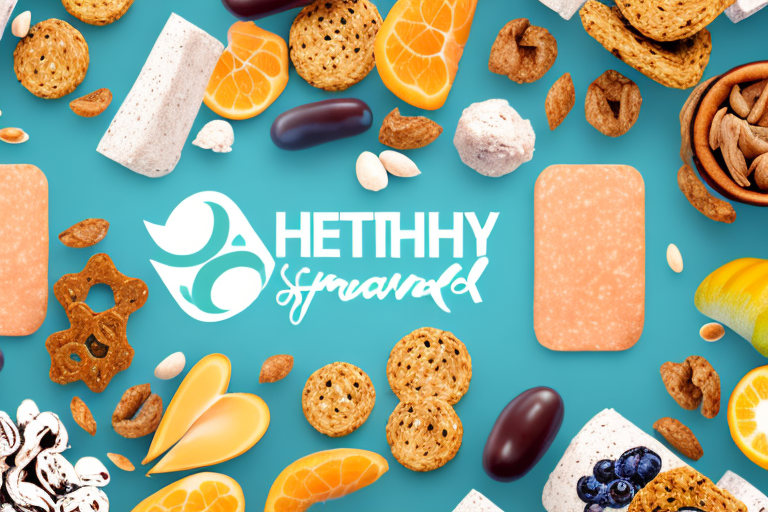
Healthy and Sustainable Snacks: How to Make the Right Choices
Snacks are a constant temptation. They are delicious, but often unhealthy and unsustainable. Finding sustainable and healthy options can seem daunting, but it’s easier than you think! In this article, we’ll explore the benefits of healthy and sustainable snacking, key ingredients to look for, popular snack options, and even creating your own nourishing treats at home. So, sit back, grab a snack (preferably healthy and sustainable!), and let’s dive in.
Understanding the Importance of Healthy and Sustainable Snacks
Beyond just satisfying our hunger, snacks serve an important purpose in our lives. They can provide energy when we’re feeling sluggish, comfort when we’re stressed or anxious, and a break from the monotony of everyday life. But not all snacks are created equal. Many pre-packaged snacks are filled with empty calories, artificial ingredients, and unnecessary packaging waste. This is where healthy and sustainable snacks come in.
The Benefits of Healthy Snacking
Healthy snacks can do wonders for our bodies and minds. By choosing nutrient-dense options like fruits, vegetables, and whole grains, we can provide our bodies with the vitamins and minerals they need to function at their best. Snacking can also help regulate blood sugar levels and prevent overeating during meals. This can lead to increased energy levels and improved overall health.
For example, snacking on a handful of almonds can provide a quick energy boost and help keep you feeling full between meals. Apples are another great option, as they contain fiber and antioxidants that can improve digestion and reduce inflammation in the body. And if you're craving something sweet, try snacking on a few squares of dark chocolate, which is rich in antioxidants and can even improve brain function.
The Environmental Impact of Sustainable Snacking
Sustainable snacking is equally important. The food industry is one of the biggest contributors to environmental damage. Pre-packaged snacks often come with excessive packaging that ends up in landfills or oceans. Sustainable snacking means opting for whole foods or snacks with eco-friendly packaging, reducing our carbon footprint and supporting ethical food production.
For example, instead of buying individually wrapped snack packs, try buying in bulk and using reusable containers to portion out your snacks. You can also look for snacks that come in compostable packaging, such as snack bars wrapped in paper or popcorn in a reusable tin. By making small changes like these, we can reduce our impact on the environment and support companies that prioritize sustainability.
Supporting Local and Ethical Food Producers
Choosing healthy and sustainable snacks also means supporting local and ethical food producers. By opting for locally grown fruits and vegetables, we can reduce the transportation and chemicals needed for preservation. Ethical food producers care for the earth and prioritize fair treatment of workers. By choosing products from these sources, we are making a positive impact on our communities and planet.
For example, if you're looking for a snack that's both healthy and sustainable, try snacking on some locally grown carrots or cherry tomatoes. Not only are these options packed with vitamins and minerals, but they also support local farmers and reduce the carbon footprint associated with transportation. And if you're in the mood for something a little more indulgent, try snacking on some fair trade chocolate or a bag of ethically sourced popcorn.
In conclusion, healthy and sustainable snacks are an important part of our daily lives. By choosing snacks that are nutrient-dense, eco-friendly, and ethically produced, we can support our own health and the health of our planet. So next time you reach for a snack, think about the impact it has on your body and the world around you.
Key Ingredients to Look for in Healthy and Sustainable Snacks
When it comes to snacking, it can be difficult to make healthy and sustainable choices. However, with a little knowledge and effort, it is possible to find snacks that are both nourishing and eco-friendly. Here are some key ingredients to look for:
Nutrient-Dense Foods for Optimal Health
One of the most important things to consider when choosing a snack is its nutritional value. Nutrient-dense foods are those that are packed with vitamins, minerals, and other essential nutrients. These foods not only provide us with the energy we need to get through the day, but they also help to keep our bodies functioning properly.
Some examples of nutrient-dense foods include:
- Fruits and vegetables: These are some of the best sources of vitamins and minerals. They are also low in calories and high in fiber, which makes them great for weight management.
- Nuts and seeds: These are high in healthy fats, protein, and fiber. They are also very filling, which can help to curb cravings and prevent overeating.
- Whole grains: These are an excellent source of complex carbohydrates, which provide sustained energy. They are also high in fiber and other important nutrients.
Some easy and delicious ways to incorporate these foods into your snacking routine include:
- Dried fruit: This is a great option for when you're on the go. It's portable, non-perishable, and can satisfy your sweet tooth without added sugars.
- Raw veggies with hummus: This is a classic snack that never gets old. Carrots, celery, bell peppers, and cucumbers all make great dippers for hummus.
- Mixed nuts: This is a simple and satisfying snack that you can customize to your liking. Try mixing almonds, cashews, and walnuts for a variety of flavors and textures.
Plant-Based Ingredients for Sustainability
Another important factor to consider when choosing snacks is their impact on the environment. Plant-based ingredients are a great choice for sustainable snacking because they require fewer resources to produce than animal-based products. They are also often more affordable and cruelty-free.
Some examples of plant-based snacks include:
- Mushroom jerky: This is a great alternative to traditional beef jerky. It's high in protein and has a meaty texture, but it's made from mushrooms instead of animal products.
- Chickpea snacks: These are a crunchy and flavorful snack that are high in protein and fiber. They come in a variety of flavors, such as barbecue and sea salt.
- Roasted seaweed snacks: These are a low-calorie and nutrient-dense snack that are high in iodine and other important minerals. They have a salty and savory flavor that can satisfy cravings for chips or other salty snacks.
Avoiding Processed and Artificial Additives
Finally, it's important to avoid processed and artificial additives when choosing snacks. These can be harmful to our bodies and the environment, and they often provide little nutritional value. Instead, look for snacks made with real, whole foods and minimal additives.
Some examples of whole food snacks include:
- Popcorn: This is a classic snack that can be seasoned with a variety of flavors, such as nutritional yeast and garlic powder.
- Fruit leather: This is a great option for when you're craving something sweet. It's made from real fruit and can be a healthier alternative to candy or other sugary snacks.
- Homemade energy balls: These are a great way to satisfy your sweet tooth while also providing a boost of energy. They can be made with a variety of ingredients, such as dates, nuts, and cocoa powder.
By incorporating these key ingredients into your snacking routine, you can make healthier and more sustainable choices that are better for both you and the planet.
Popular Healthy and Sustainable Snack Options
Snacking is a great way to keep your energy levels up throughout the day, but it can be difficult to find healthy and sustainable options. Fortunately, there are plenty of pre-packaged snacks that are both nutritious and good for the environment. Here are some of the most popular:
Fresh Fruits and Vegetables
Fresh fruits and vegetables are a classic choice when it comes to healthy and sustainable snacking. They are conveniently packaged by nature, require no preparation, and are packed with vitamins and minerals. Some favorites include apples, carrots, and grapes. If you need a bit of extra flavor, try dipping them in nut butter or hummus.
Did you know that eating a variety of fruits and vegetables can help reduce your risk of chronic diseases like heart disease and cancer? It's true! Plus, choosing locally grown produce can help reduce your carbon footprint by supporting local farmers and reducing transportation emissions.
Nuts and Seeds
Nuts and seeds are another great option when it comes to healthy snacking. They are high in protein, healthy fats, and fiber, making them a filling and satisfying snack. Try grabbing a handful of almonds, cashews, or pumpkin seeds for a quick and simple snack.
In addition to being a great source of nutrition, nuts and seeds can also help support sustainable agriculture. Many nut and seed crops are grown using regenerative farming practices, which help to improve soil health and reduce the need for harmful pesticides and fertilizers.
Whole Grain Crackers and Breads
Whole grain crackers and breads are an excellent choice for those who prefer savory snacks. They are made with whole grains and are usually minimally processed, making them a great source of fiber and nutrients. Top them with sliced avocado or a hummus spread for added flavor and nutrition.
Choosing whole grain snacks can also help support sustainable agriculture. Whole grains are typically grown using fewer resources than refined grains, and they help to promote soil health and biodiversity.
Plant-Based Protein Bars and Bites
For those with a sweet tooth, plant-based protein bars and bites are a great option. They are made with whole food ingredients and often contain a good balance of macro and micronutrients. Look for bars containing nuts and seeds, dried fruit, and natural sweeteners like maple syrup or dates.
Choosing plant-based snacks can also help support sustainable agriculture by reducing the demand for animal products. Livestock farming is a major contributor to greenhouse gas emissions and can have negative impacts on land and water resources.
Next time you're looking for a snack, consider one of these healthy and sustainable options. Your body and the planet will thank you!
Creating Your Own Healthy and Sustainable Snacks at Home
While there are plenty of pre-packaged options to choose from, creating your own healthy and sustainable snacks at home can be a fun and rewarding experience. Here are some tips to get started:
Easy and Nutritious Recipes to Try
There are countless recipes available online for healthy and sustainable snacks that can be made at home. Some favorites include homemade granola bars, fruit and nut energy balls, and roasted chickpeas. These recipes use simple, whole food ingredients and are easy to customize to your liking.
Tips for Reducing Food Waste in Snack Preparation
While making your own snacks can be a great way to reduce waste compared to pre-packaged options, it’s important to be mindful of food waste during preparation. Try to use up leftover ingredients in other recipes or find creative ways to incorporate them into future meals.
Storing and Packaging Snacks for On-the-Go Convenience
When creating your own snacks, be sure to store and package them in a way that makes them easy to grab and go. Mason jars, reusable containers, and beeswax wraps are all great options for reducing waste and keeping your snacks fresh and convenient.
Conclusion
Snacking can be a healthy and sustainable part of our lives with just a little bit of effort and mindfulness. By focusing on nutrient-dense ingredients, avoiding processed additives, and choosing eco-friendly packaging, we can make a positive impact on our own health and the health of our environment. And with plenty of pre-packaged options and easy homemade recipes available, there’s no reason not to give it a try!
